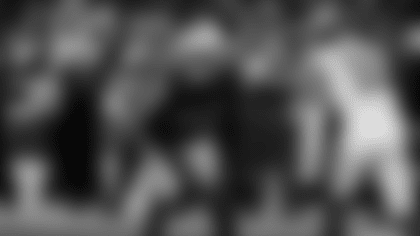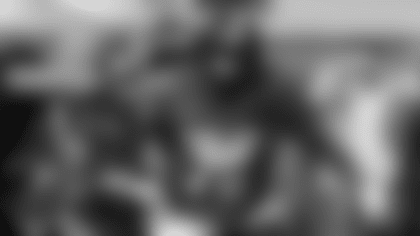For all professional athletes, in the back of their minds they know Father Time will eventually catch up with them, and they'll be forced to retire; whether it's from injury or simply that the time has come, it's inevitable.
Some go on to live peaceful quite lives away from society, while others want to stay in the spotlight and enter the world of sports journalism.
For Raiders legend Rich Gannon, he never dreamt of becoming a sports broadcaster, but when the opportunity presented itself, he kept an open mind.
In 2004, Gannon retired because of a neck injury, finishing his 17-year career with 28,743 passing yards, 180 touchdowns, and a trip to the Super Bowl during his MVP season (2002). He had no plans formulated, no expectations of what post-retirement would be like, but his time in the NFL wasn't over — albeit if it was in a different capacity.
"Honestly, I had no idea," Gannon said when asked what he envisioned for himself after retirement. "I got done playing in 2004 because of the neck injury and I went home, and really had no intentions of being involved in broadcasting. Got a call from my agent and said, 'CBS wants you to come into New York and do an audition. Do you have an interest in doing it?' And I thought, I don't know. [My agent] said, 'You should probably do it.'"
Gannon said why not, and took the audition in New York; little did he know it would set him on his next long-term career path.
"I actually enjoyed the process," he said, recalling the early stages of his broadcast career. "My first year in '05 I called games and wasn't very good at it, but I knew I enjoyed the process. When I say the process, just the work that leads up to the game, you know? Watching film, studying, breaking down opponents — I shouldn't say opponents, but teams. Looking at their strengths, weakness, why they're struggling in different areas, and then you go out to practice and spend time with the coaching staff and the players. That to me was similar what I did as a player [in terms] of preparing for an NFL game."
Gannon entered the NFL in 1987, but he wasn't given his first true opportunity to start until 1990. The first half of Gannon's career wasn't his best, but he learned a lot from it, similar to his first experiences in the broadcast booth.
"I think the biggest thing was understanding television, understanding the pacing and the timing," he said. "My first game, my producer kept saying, 'Jump in, jump in!' But I was waiting and there were three or four seconds of dead air, and in the television business and you got to be quick and jump right in.
"So, we talked about letting it breathe a little bit, there's times for that, but there were too many awkward pauses and I learned that my very first game. I think you learn the mechanics, the telestrator, the talk-back-button in terms of the trucks, understanding where the cameras are, understanding how to ask for certain replays, just understanding the play-by-play and his jobs and responsibilities. There's a lot that goes into it during a game and it's not as easy people think, or more people would be doing it."
While the first half of his NFL career and his early days on the job weren't a cake walk, Gannon grew into an MVP. After stops in Minnesota, Washington, and Kansas City, Gannon was paired with Jon Gruden in 1999, and the two formed the makings of what would be a close relationship.
Gruden helped bring out some of the best football Gannon had ever played, but a lot of his production stemmed from countless hours of studying and preparation. When Gannon stepped on the field, he wanted to win, make no mistake about it. As he's grown as a broadcaster, he's carried that same work ethic with him, and it's helped establish him as a prominent commentator in the industry.
Take it from his CBS colleague of 10 years, Kevin Harlan.
"He's as prepared and detailed as a broadcaster as he was when he was quarterbacking the Raiders," said the broadcasting legend. "When he was quarterbacking the Raiders I knew that him and Gruden were like the same mind on the field. They knew what the other one was thinking, Rich probably guessed the plays that were being radioed in. I think Rich had his fingerprints all over that game plan. I think Gruden with all the quarterbacks he's worked with — no offense to Derek [Carr] or anybody else — but with Rich they were of like-mind.
He continued, "I think that he's carried that over to television now that he's so detailed, and watches tons of tape — more tape than anybody I've ever worked with, he's terrific in that regard. He's so well prepared and I go into every broadcast knowing that nothing is going to slip through the cracks and that's always very comforting."
Come Sunday, when the Oakland Raiders take on the Indianapolis Colts at Lucas Oil Stadium, the two will be in the booth together, breaking down the squad Gannon experienced countless memories with. It'd be understandable if his passion for his former team shined through, but he always keeps it professional. He's no stranger to covering the Raiders either, serving annually as a key part of the preseason coverage for the team.
Despite the close relationships Gannon has with players and coaches on the Raiders, he can't let that stand in the way of doing his job; however, he does want to see them succeed.
"What's interesting is it's a little — I wouldn't say awkward — of all the teams the Raiders are the one I had the most success with, and I'm most closest to, so I want to see everyone do well," he explained. "I don't want to call a game and see a quarterback play poorly and throw four picks. I want to see good football, I think we all want to see that. I want to see Jon [Gruden] do well, all my guys that are my guys that are here. I care about Derek [Carr] I want to see him do well, but I don't have a totally invested interest in the game. I can't. I have to be unbiased and I have to be neutral, I have to be a broadcaster and be professional."
As the Raiders celebrate their 60th anniversary, Gannon is one of several notable players who have gone on to do incredible things in their post-NFL career. He didn't foresee being a successful broadcaster for 15 years, but he's making the Silver and Black proud. He's not in the building as much as he used to be, but he relishes sitting in production meetings with his former coach, Jon Gruden. More than anything though, Gannon is happy to still share special connections with members of the Raiders, and he gives credit to Al Davis building an organization that honors its alumni.
"[Al Davis] created an organization that relishes not just winning, but winning at the highest level," Gannon said. "When I was here and we'd go 12-4 and we'd win the division it didn't matter to him, he was only about the one thing. That's what I think I appreciate, I certainly appreciate the rich history and tradition. I really appreciate the players that have played here, there's a lot of amazing players that I played with, that I played against when I was not here that really created a legacy and something we could be proud of. That's what I encourage these players now is that they have an opportunity to do something special and this business doesn't last forever."
It doesn't last forever, but may the players that follow Gannon be as fortunate to find great success when it's finally time to hang up their cleats.














